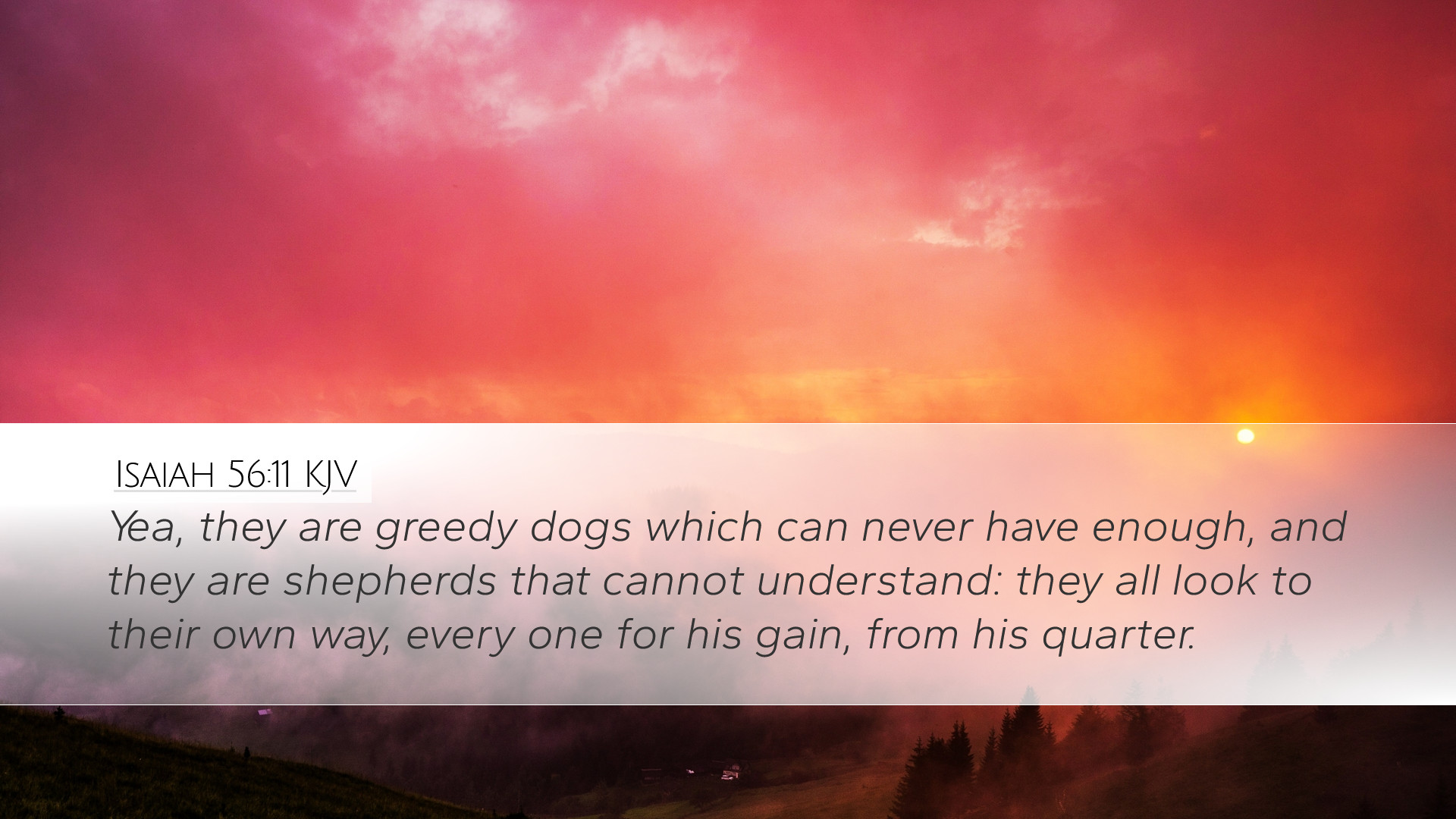Commentary on Isaiah 56:11
Isaiah 56:11 states: "Yea, they are greedy dogs which can never have enough, and they are shepherds that cannot understand: they all look to their own way, every one for his gain, from his quarter."
Introduction
This verse is part of a broader passage in Isaiah that critiques the unfaithfulness and avarice of religious leaders and people in Israel. The metaphor of dogs, which in the ancient Near East was often used to denote unclean or greedy beings, contrasts sharply with the expectations of shepherds who are called to lead, protect, and nourish their flock.
Exegesis and Interpretation
Matthew Henry's Insight
Henry notes that the description of the "greedy dogs" serves as a vivid illustration of the failure of those in spiritual authority. They are depicted as insatiable and self-serving, lacking the fundamental qualities of true leaders.
- Greediness: Henry emphasizes that these leaders are characterized by their endless desire for personal gain, which aligns with the portrayal of dogs as scavengers.
- Lack of Understanding: The reference to "shepherds that cannot understand" highlights a significant deficiency in spiritual discernment among religious leaders.
- Selfishness: Their focus is exclusively on their own interests, disregarding their responsibilities towards the people they are meant to serve.
Albert Barnes' Analysis
Barnes expands on the metaphor, arguing that the "dogs" represent false prophets and corrupt leaders who have abandoned their true calling. He underscores the following points:
- Prophetic Accountability: Barnes stresses the expectation of spiritual leaders to hold a prophetic voice that seeks the welfare of God's people rather than their own enrichment.
- Nature of True Leadership: He contrasts this negativity with the qualities of good shepherds, who care for the flock, illustrating God’s desire for leaders to embody compassion and responsibility.
- Universal Application: The traits described transcend the specific cultural context, resonating in various forms throughout history where leaders misuse their authority for personal gain.
Adam Clarke's Reflection
Clarke provides a thorough examination of the qualities depicted in this verse, shedding light on the broader implications of leaders' misconduct:
- Corruption in Leadership: Clarke elaborates on the corruption that stems from greed, warning that such behavior infects the community and leads to spiritual decline.
- Judgment of Leaders: He notes that leaders will ultimately face divine judgment due to their betrayal of their calling as shepherds to the people.
- Hope for Restoration: Despite the grim portrayal, Clarke points towards the hope embedded in the prophecy—God’s intention to restore true worship and leadership among His people.
Theological Implications
This verse carries weighty theological implications, particularly regarding the nature of godly leadership. It challenges current and future leaders within the church to examine their motivations and actions.
- Shepherding as a Calling: The passage underscores the notion that to lead is to serve. A true shepherd prioritizes the needs of the flock over personal ambition.
- Spiritual Discernment: Leaders must cultivate understanding and wisdom; they should not only be aware of their own desires but should align with God's will for His people.
- Judgment and Accountability: In light of this text, there is a reminder of the responsibility that comes with leadership. God judges those who mislead His people, emphasizing the weight of their role.
Conclusion
Isaiah 56:11 serves as a pertinent warning against greed and self-serving leadership within religious contexts. The insights from Henry, Barnes, and Clarke resonate through time, urging contemporary leaders to reflect on their roles as shepherds and to strive for integrity, wisdom, and a genuine heart for God's people. The lessons from this verse remain relevant for pastors, students, theologians, and scholars seeking to understand the dynamics of leadership within sacred spaces.


